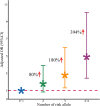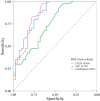Novel Functional eQTL-SNPs Associated With Susceptibility to Mycoplasma pneumoniae Pneumonia in Children
- PMID: 35836993
- PMCID: PMC9273990
- DOI: 10.3389/fpubh.2022.899045
Novel Functional eQTL-SNPs Associated With Susceptibility to Mycoplasma pneumoniae Pneumonia in Children
Abstract
Background: The functional causal single-nucleotide polymorphisms (SNPs) associated with susceptibility to Mycoplasma pneumoniae Pneumonia (MPP) have scarcely been identified. In this study, we aimed to analyze the association between the functional expression quantitative trait locus (eQTL)-SNPs and the risk of MPP.
Methods: First, we identified reported genes associated with MPP from the human disease database, MalaCards. After investigating multiple databases, we systematically selected seven functional eQTL-SNPs (rs2070874, rs360720, rs8032531, rs4316, rs4353, rs7258241, and rs2250656). Finally, the selected eQTL-SNPs were genotyped using the TaqMan genotyping technology, and compared between 100 children with MPP and 178 healthy controls.
Results: We found that three eQTL-SNPs (rs8032531 in CD276 and rs4316 and rs4353 in ACE) were significantly associated with susceptibility to MPP. Joint analysis of the three eQTL-SNPs revealed that the risk of MPP increased with an increase in the number of risk alleles present. Plasma protein expression levels of CD276 and ACE were distinctively higher in children with MPP than in healthy children (CD276: P < 0.001; ACE: P = 0.001).
Conclusion: Functional eQTL-SNPs in CD276 and ACE may affect the susceptibility to MPP. The risk of developing MPP is higher in patients harboring a greater number of unfavorable alleles of the aforementioned SNPs.
Keywords: ACE; CD276; Mycoplasma pneumoniae Pneumonia; single-nucleotide polymorphisms; susceptibility.
Copyright © 2022 Dong, Gao, Luo, Wu, Cheng, Qiu, Zhou, Zhang, Chu and Chang.
Conflict of interest statement
The authors declare that the research was conducted in the absence of any commercial or financial relationships that could be construed as a potential conflict of interest.
Figures





References
Publication types
MeSH terms
Substances
LinkOut - more resources
Full Text Sources
Research Materials
Miscellaneous

